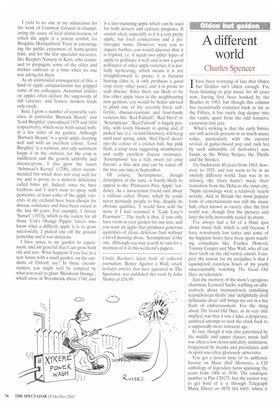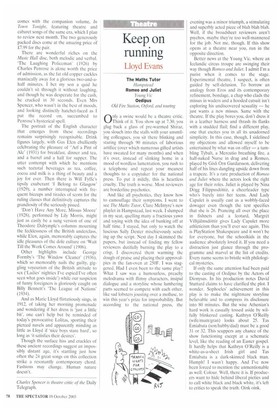A different world
Charles Spencer
T have been worrying of late that Olden 1 but Golden isn't olden enough. I've been listening to pop music for 40 years now, having first been hooked by the Beatles in 1963, but though this column has occasionally ventured back as far as the Fifties, it has rarely dug deeper into the vaults, apart from the odd tentative excursion into jazz.
What's striking is that the early Sixties are still actively present in so much music today, particularly with the current revival of guitar-based pop and rock led by such admirable (if derivative) new bands as the White Stripes, the Thrills and the Strokes.
Go backwards 40 years from 1963, however, to 1923, and you seem to be in an entirely different world. Jazz was in its infancy, the blues hadn't made their transition from the Delta to the inner city, 78rpm recordings were a relatively recent novelty. And in Britain the most popular form of entertainment was still the music hall, often known as variety after the first world war, though first the pictures and later the telly inexorably sealed its doom.
I've always had a bit of a blind spot about music hall, which is odd because I have notoriously low tastes and some of my happiest hours have been spent watching comedians like Frankie Howerd, Tommy Cooper and Max Wall, who all cut their teeth on the old variety circuit. I suspect the reason for my prejudice is that I squandered countless hours of my youth unaccountably watching The Good Old Days on television.
Just the memory of the show's egregious chairman, Leonard Sachs, waffling on alliteratively about 'tremendously tantalising terpsichorean thrills' and 'delightfully droll debutante divas' still brings me out in a hot flush of embarrassment. For the thing about The Good Old Days, as its very title implied, was that it was a fake, a desperate, sanitised attempt to turn the clock back to a supposedly more innocent age.
In fact, though it was also patronised by the middle and upper classes, music hall was often a low-down-and-dirty institution, frequented by drunks and prostitutes, and its spirit was often gloriously subversive.
You get a potent taste of its authentic flavour on Music Hall Memories, a CD anthology of legendary turns spanning the years from 1906 to 1938. The catalogue number is Plat CD173, but the easiest way to get hold of it is through Telegraph Music Direct on 0870 164 6465, where it
comes with the companion volume, In Town Tonight, featuring theatre and cabaret songs of the same era, which I plan to review next month. The two generously packed discs come at the amazing price of £7.99 for the pair.
There are wonderful riches on the Music Hall disc, both melodic and verbal. 'The Laughing Policeman' (1926) by Charles Penrose is alone worth the price of admission, as the fat old copper cackles maniacally away for a glorious two-and-ahalf minutes. I bet my son a quid he couldn't sit through it without laughing, and though he was desperate for the cash, he cracked in 30 seconds. Even Mrs Spencer, who wasn't in the best of moods, and looking distinctly hatchet-faced as I put the record on, succumbed to Penrose's hysterical spell.
The portrait of the English character that emerges from these recordings remains surprisingly recognisable. Drink figures largely, with Gus Elen ebulliently celebrating the pleasure of "Ad a Pint of Ale' (1931) for breakfast, dinner and tea, and a barrel and a half for supper. The utter contempt with which he mentions such teetotal beverages as tea, coffee, cocoa and milk is a thing of beauty and a joy for ever. Then there is Will Fyffe's tipsily exuberant 'I Belong to Glasgow' (1929), a number interrupted with frequent hiccups and tirades of scorn for the ruling classes that definitively captures the grandiosity of the seriously pissed.
'Don't Have Any More, Missus Moore' (1925), performed by Lily Morris, might just as easily be a sung version of one of Theodore Dalryrnple's columns mourning the fecklessness of the British underclass, while Elen, again, memorably captures the idle pleasures of the dole culture on 'Wait Till the Work Comes Around' (1906).
Other highlights include George Formby's The Window Cleaner' (1936), which so memorably nails the guilty, giggling voyeurism of the British attitude to sex (Ladies' nighties I've espied/I've often seen what goes inside') while our suspicion of funny foreigners is gloriously caught on Billy Bennett's 'The League of Nations' (1934).
And as Marie Lloyd flirtatiously sings, in 1912, of taking her morning promenade and wondering if her dress is 'just a little bit', one can't help but be reminded of today's provocative Lolitas, sporting their pierced navels and apparently minding as little as Lloyd if 'nice boys stare hard', so long as 'it satisfies their desires'.
Though the surface hiss and crackles of these ancient recordings suggest an impossibly distant age, it's startling just how often the 24 great songs on this collection strike a resonantly contemporary chord. Fashions may change. Human nature doesn't.
Charles Spencer is theatre critic of the Daily Telegraph.



































































































 Previous page
Previous page